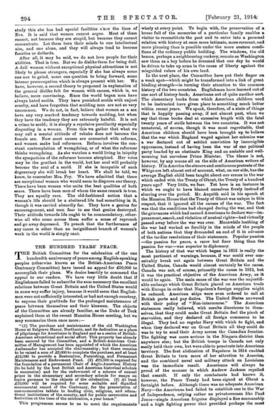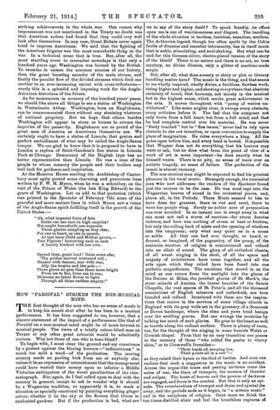THE HUNDRED YEA_RS' PEACE.
THE British Committee for the celebration of the one hundredth anniversary of peace among English-speaking peoples (otherwise known as the British-American Peace Centenary Committee) have issued an appeal for £50,000 to accomplish their plans. We desire heartily to commend the appeal to our readers. We have very little doubt that if Englishmen failed to subscribe the sum necessary the excellent relations between Great Britain and the United States would in some way suffer injury, because it would seem that English- men were not sufficiently interested, or had not enough courtesy, to express their gratitude for the prolonged maintenance of peace between themselves and their kinsmen. The objects of the Committee are already familiar, as the Duke of Tech explained them at the recent Mansion House meeting, but we may summarize them once more:— " (I) The purchase and maintenance of the old Washington Home at Sulgrave Manor, Northants, and its dedication as a place of pilgrimage for Americans in England and as a centre of British- American educational and social effort. This property has already been secured by the Committee, and a British-American Com- mittee of Management has been appointed of which the American Ambassador has accepted the chairmanship ; but there remains to be sawed a sum of 22,000 to complete the purchase, and at least 215,000 to provide a Restoration, Parniahing, and Permanent Maintenance and Endowment Fund. (2) 225,000 is required for the foundation of a permanent Chair of Anglo-American History (to be held by the best British and American historical scholars in succession) and for the endowment of a scheme of annual prizes in the elementary and secondary schools for essays on topics germane to the objects of the celebration. (3) At least £10,000 will be required for some suitable and dignified monumental record of the Centenary, for the presentation of commemorative tablets to lending civic, religions, and educe- Corral institutions of the country, and for public ceremonies and festivities at the time of the celebration, a year hence."
This programme seems to as to meet the requirements wisely at every point To begin with, the preservation of house full of the memories of a particular family enables a visitor to reconstitute the past and to enter into a personal relation with history at once more intimate, more reverent, and more pleasing than is possible under the more austere condi- tions of the ordinary public building. The windows, the old beams, perhaps a neighbouring rookery, remain as Washington saw them as a boy before he dreamed that one day he would be driven to take up arms in the cause of liberty against the misguided rulers of his own laud.
In the next place, the Committee have put their finger on a weak spot—which might be transformed into a link of great binding strength—in turning their attention to the common history of the two countries. Englishmen have learned out of one sort of history-book; Americans out of quite another sort. The elementary books from which American children used to be instructed have given plane to something much better within recent years. We speak, therefore, of a state of things that is happily passing away, if not almost past, when we say that those books deal at excessive length with the fatal twenty years of strife between the two countries. It was not unnatural, of coarse, though it was most regrettable, that American children should have been brought up to believe that the war which England waged against her colonies was a war declared out of settled conviction by incorrigible oppressors, instead of having been the war of one political party headed by an obstinate King and an amiable and well- meaning but nerveless Prime Minister. The blame is not, however, by any means all on the side of American writers of history. If in America the sincere and continuous protests of the Whigs are left almost out of account, what, on oar side, has the average English child been taught about our errors in the war which ended with the Treaty of Ghent, the Treaty of a hundred years ago? Very little, we fear. Yet here is an instance in which we ought to have blamed ourselves freely instead of slurring over the period. Mr. Asquith said in his speech at the Mansion House that the Treaty of Ghent was unique in this respect, that it ignored all the causes of the war. The fact was that the conditions had changed during the war, and that the grievances which had caused Americans to declare war—im- pressment,search, and violation of neutral rights—had virtually passed away before the war was over. Meanwhile loathing of the war had worked so forcibly in the minds of the people of both nations that they demanded an used of it in advance of the tardier resolutions of their statesmen. Popular passion —the passion for peace, a rarer but finer thing than the passion for war—was superior to diplomacy.
The history of that war which began in 1812 is really the most pertinent of warninge, because, if war could ever con- ceivably break out again between Great Britain and the United States, Canada would almost certainly be the cause. Canada was not, of course, primarily the cause in 1812, but it was the practical objective of the American Army, as it would be again. The main cause of the war was the unjustifi- able embargo which Great Britain placed on American trade with Europe in order that Napoleon's foreign supplies might be reduced. American ships were even ordered to call at British ports and pay duties. The United States answered with their policy of "Non-intercourse." The American statesmen really believed, with results disastrous to them- selves, that they could make Great Britain feel the pinch of starvation, sad they declared all foreign commerce to be illegal. They had no regular Navy with which to fight, and when they declared war on Great Britain all they could do was to try to send their Army across the Canadian frontier. The fighting was more serious in the Niagara district than anywhere else; but the British troops in Canada not only smelly held their own, but were able to penetrate into American territory. The first abdication of Napoleon in 1814 enabled Great Britain to turn more of her attention to America, and the combined naval and military attack on Louisiana was the immediate result. Americans will always be proud of the manner in which Andrew Jackson repelled that assault. If only the combatants had known it, however, the Peace Treaty had been signed at Cheat a fortnight before. Although there was no adequate American Navy—the Americans had failed to establish one in the War of Independence, relying rather on privateeramen like Paul Jones—single American frigates displayed a fine seamanship and a high fighting power that provided perhaps the most
striking achievements in the whole war. One reason why impressment was not mentioned in the Treaty no doubt was that American sailors had found that they could very well look after themselves. In any case, Great Britain never again tiled to impress Americans. We said that the fighting of the American frigates was the most remarkable thing in the war. In a technical sense that is true. But, after all, the most startling event to remember nowadays is that only a hundred years ago Washington was burned by the British. To examine in unison the common sources of our history, then the great bursting asunder of the main stream, and finally the parallel flow of the divided streams which feed one another to an ever-increasing extent with cross-tributaries- surely this is a splendid and imposing work for the Anglo- American historians of the future.
As for monuments in memory of the hundred years' peace, we should like above all things to see a statue of Washington in Westminster Abbey. Washington, born an Englishman, can be commemorated there without any straining whatever of national propriety. But we hope that others besides Washington will appear in stone or bronze to attract the inquiries of the passer-by. Englishmen are as proud of the great men of America as Americans themselves are. We certainly ought to have a statue of Lincoln, that genius and perfect embodiment of what may be called the Anglo-Saxon temper. We are glad to know that it is proposed to have in London a replica of Saint-Gaudens's fine statue in Lincoln Park at Chicago. Democracy of the English type has no better representative than Lincoln. He was a man of the people to whose memory the people and their leaders may well look for guidance and inspiration.
At the Mansion House meeting the Archbishop of Canter- bury most aptly quoted some charming and precocious lines written by F. W. H. Myers, when he was a schoolboy, on the visit of the Prince of Wales (the late King Edward) to the grave of Washington. Let us add to that quotation (which was printed in the Spectator of February 7th) some of the graceful and more mature lines in which Myers saw a vision of the Anglo-Saxon spirit fulfilling itself in the growth of the United States:—
" Ah, what imperial force of fate
Links our one race in high emprize! Nor aught henceforth can separate Those glories mingling as they rise; For one in heart, as one in speech, At last have Child and Mother grown,— Fair Figures ! honouring each in each A beauty kindred with her own.
Spread then, great land ! thine arms afar, Thy golden harvest westward roll ; Banner with banner, star with star, Ally the tropics and the pole ;— There glows no gem than these more bright
From i00 to fire, from sea 80 sea; Blossoms no fairer flower to light
Through all thine endless empery."















































 Previous page
Previous page